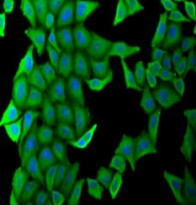ARG43462
anti-KMT3C / SMYD2 antibody
anti-KMT3C / SMYD2 antibody for ICC/IF,Western blot and Human,Mouse
Overview
| Product Description | Rabbit Polyclonal antibody recognizes KMT3C / SMYD2. |
|---|---|
| Tested Reactivity | Hu, Ms |
| Tested Application | ICC/IF, WB |
| Host | Rabbit |
| Clonality | Polyclonal |
| Isotype | IgG |
| Target Name | KMT3C / SMYD2 |
| Antigen Species | Human |
| Immunogen | Purified recombinant protein corresponding to human KMT3C / SMYD2. |
| Conjugation | Un-conjugated |
| Protein Full Name | N-lysine methyltransferase SMYD2 |
| Alternate Names | KMT3C; HSKM-B; ZMYND14 |
Application Instructions
| Application Suggestion |
|
||||||
|---|---|---|---|---|---|---|---|
| Application Note | * The dilutions indicate recommended starting dilutions and the optimal dilutions or concentrations should be determined by the scientist. |
Properties
| Form | Liquid |
|---|---|
| Purification | Affinity purified. |
| Buffer | PBS (pH 7.3), 0.02% Sodium azide and 50% Glycerol. |
| Preservative | 0.02% Sodium azide |
| Stabilizer | 50% Glycerol |
| Storage Instruction | For continuous use, store undiluted antibody at 2-8°C for up to a week. For long-term storage, aliquot and store at -20°C or below. Storage in frost free freezers is not recommended. Avoid repeated freeze/thaw cycles. Suggest spin the vial prior to opening. The antibody solution should be gently mixed before use. |
| Note | For laboratory research only, not for drug, diagnostic or other use. |
Bioinformation
| Database Links | |
|---|---|
| Gene Symbol | SMYD2 |
| Gene Full Name | SET and MYND domain containing 2 |
| Background | SET domain-containing proteins, such as SMYD2, catalyze lysine methylation (Brown et al., 2006 [PubMed 16805913]).[supplied by OMIM, Nov 2008] |
| Function | Protein-lysine N-methyltransferase that methylates both histones and non-histone proteins, including p53/TP53 and RB1. Specifically methylates histone H3 'Lys-4' (H3K4me) and dimethylates histone H3 'Lys-36' (H3K36me2). Shows even higher methyltransferase activity on p53/TP53. Monomethylates 'Lys-370' of p53/TP53, leading to decreased DNA-binding activity and subsequent transcriptional regulation activity of p53/TP53. Monomethylates RB1 at 'Lys-860'. [UniProt] |
Images (2) Click the Picture to Zoom In







